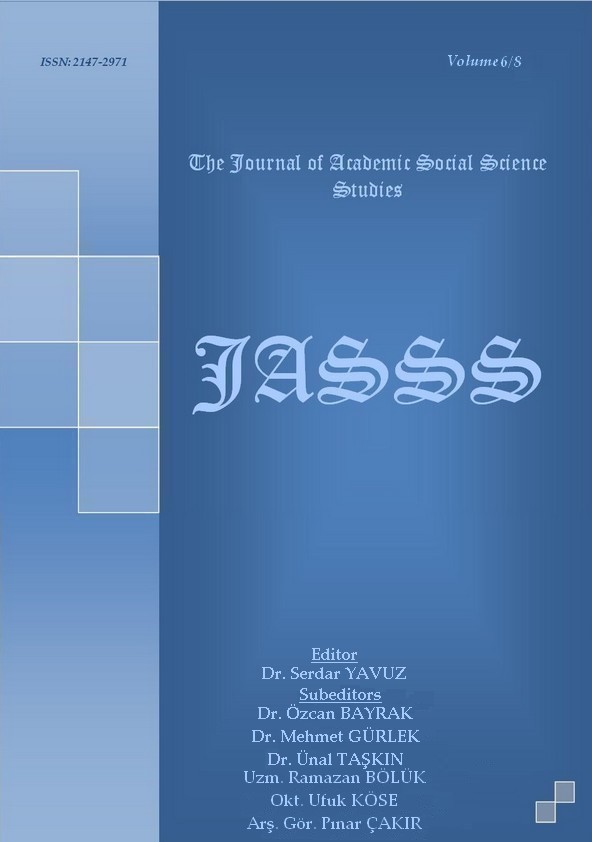Author :
Abstract
Dünya tarihi içerisinde bugüne kadar geliştirilmiş tahrip gücü en yüksek silahlar nükleer olanlardır. İlk kez 1945 yılında kullanılan bu silahlar o tarihten itibaren uluslararası güvenlik tartışmalarının ilk sırasında yer almaktadır. Bugün itibariyle nükleer silahlara sahip olan ülke sayısı dokuzdur ve bu sayının daha fazla artmaması için uluslararası alanda büyük bir mücadele yürütülmektedir. 21. Yüzyıl itibariyle bu silahlara sahip olan ilk ülke Kuzey Kore olmuştur ve nükleer teknoloji peşinde çaba sarfeden İran’ın da bu silahları üretme niyetinde olduğu düşünülmektedir. Bununla birlikte uluslararası güvenlik açısından endişe verici olan nükleer silahlara sahip yeni devletlerin ortaya çıkması ile birlikte uluslararası terör örgütlerinin de bu silahları bir şekilde elde etme ihtimalidir. Bu çalışmada öncelikle nükleer silahlara sahip olan ülke sayısının artmaması için uluslararası sistemde verilen mücadele ele alınmaktadır. Bu doğrultuda Kuzey Kore ve İran’ın nükleer faaliyetleri söz konusu edilmekte ve başta ABD olmak üzere genel anlamda Batı dünyasının konstrüktivist anlayışla meselelere yaklaştığı ifade edilmektedir. İkinci kısımda ise nükleer tehditin uluslararası güvenliği ilgilendiren bir başka boyutunun terör örgütleri ile ilgili olduğuna vurgu yapılmaktadır. Devletlerin rasyonel davranacaklarına olan inanca karşın bu yaklaşımdan tümüyle uzak hareket eden uluslararası terör örgütlerinin bu silahlara sahip olmasının ne derece ürkütücü sonuçlara yol açabileceğine işaret edilmektedir. Bu bağlamda son olarak uluslararası işbirliğinin önemine dikkat çekilmektedir.
Keywords
Abstract
Nuclear bombs are the most destructive weapons developed so far in the world history. First used in 1945, these weapons have since become the most important subject of arguments on international security. As of today there nine countries with nuclear arms in the world and a big struggle is underway in the international arena to prevent this number from increasing. North Korea was the first country to acquire these weapons in the twenty first century and having sought nuclear technology, Iran is also thought to be intent on production of such weapons. On the other hand, the main concerning point from the perspective of international security is that the rise of new nuclear weapon states may pave the way for terror organization to somehow acquire such weapons. This study firstly looks at the struggle underway in the international system to prevent an increase in the number of countries with nuclear weapons. In this regard the nuclear activities of North Korea and Iran are assessed and it is said that the Western world and especially the USA is thought to be considering the issues with a constructivist understanding. In the second chapter it is emphasized that another aspect of the nuclear threat for the international security is about the terrorist organizations. While there is a belief that the nuclear states will act rationally, the terrorist organizations who behave wholly in contrast with this approach pose a serious cause of concern because of frightening results that may occur if they get their hands on such weapons. In this sense the importance of international cooperation is mentioned as a final note.
Keywords
- AKÇADAĞ, Emine (2010), “Yumuşak Güç Japonya’nın Sert Güç Arayışları”, Bilge Strateji, 1(3),12-13.
- ARAS, Bülent (2005), “11 Eylül, Büyük Orta Doğu ve Türkiye”, Avrasya Dosyası, (11), 3.
- BEHEŞTİ, Hüseyin (2010), İran Nükleer Meselesi ve Stratejik Hesaplar”, Stratejik Düşünce, 1(7),20.
- CRAIG, Ken (2007), “The Nuclear Non-Proliferation Treaty: Achieving International Security Through Diplomacy”, Canadian Military Journal.
- FUKUYAMA, Francis (2012), Tarihin Sonu ve Son İnsan, İstanbul: Profil Yayıncılık
- HUNTINGTON, Samuel (2005), Medeniyetler Çatışması, İstanbul: Vadi Yayınları
- KHALIUN, Angar (2007), Kuzey Kore’nin Nükleer Politikası, Yayınlanmamış Yüksek Lisans Tezi, Ankara Üniversitesi Sosyal Bilimler Enstitüsü.
- KİBAROĞLU, Mustafa (2004), “Kuzey Kore’nin Nükleer Silah Programı: Sebepler ve Sonuçlar”, Uluslararası İlişkiler, 1 (1), 156-158.
- KİBAROĞLU, Mustafa (2005), “Enerji mi? Silah mı? Nükleerin İki Yüzü”, Avrasya Dosyası Nükleer Özel Sayı, 9.
- KİBAROĞLU, Mustafa (2006), “Kitle İmha Silahları İle Terör: Kıyametin Yeni Eşiği Mi?”, Avrasya Dosyası, 12(3).
- KÖSE, Talha (2008), İran Nükleer Programı ve Orta Doğu Siyaseti: Güç Dengeleri ve Diplomasinin İmkanları, Ankara: Seta.
- KULOĞLU, Armağan (2010), “İran’ın Nükleer Teknoloji Çıkmazı, Gelişmeler ve Türkiye”, Ortadoğu Analiz, 2(19-20),60.
- ÖZGÜR, Salih (2006), Geleceğe Yönelen Tehdit, Kitle İmha Silahları, İstanbul: IQ Kültür Sanat Yayıncılık.
- URL, “Nükleer Silahların Yayılmasının Önlenmesine İlişkin Antlaşma (NPT)”(2010), http://www.taek.gov.tr/uluslararasi/cok-tarafli-anlasmalar-sozlesmeler/134npt.html (10.05.2011).
- URL, “Nuclear Weapons”, http://www.globalsecurity.org/wmd/world/israel/nuke.htm, (16.07.2013)
- URL, “ABD ‘Haydut Devletler’ Listesini Gözden Geçiriyor” (2008), http://www.dw- world.de/dw/article/0,,3442792,00.html (19.05.2011).
- URL, “President Obama on Afghanistan and Pakistan”(t.y.), http://www.america.gov/st/texttransenglish/2009/December/20091203182148abretnuh0. 894152.html&distid =ucs#ixzz0Zw9AAoER (22.05.2011).
- URL, “International Convention fort he Suppression of Acts of Nuclear Terrorism” (t.y.), http://untreaty.un.org/cod/avl/ha/icsant/icsant.html, (23.05.2011).
- UŞAKLI, Ali Bülent (2009), “Nükleer Güç Olarak İran’ın Uluslararası Sistemdeki Yeni Konumu ve Konunun Türkiye Açısından Değerlendirilmesi”, Stratejik Araştırmalar Dergisi, 13.WENDT,
- Alexander (2003), Social Theory of International Politics, New York: Cambridge University Press.





